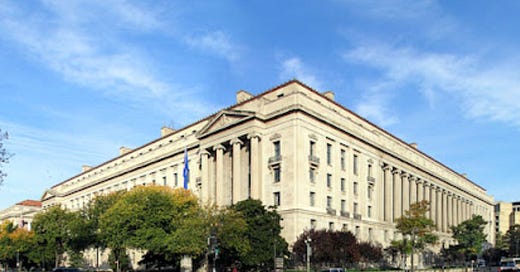Is a New "Non-Federal" Era Coming to Washington Real Estate?
US government considers selling FBI and DoJ headquarters
The U.S. government is contemplating selling the FBI and Department of Justice headquarters, which could signal a seismic shift in Washington, D.C., real estate. These iconic buildings, long-standing symbols of federal authority and power, may soon be replaced by private-sector developments, ushering in an era in which the private market plays a more significant role in shaping the capital's architectural and cultural landscape.
As the federal government grapples with budgetary constraints and the need for modernization, selling these historic properties has gained traction. The potential sale raises many questions: What might replace these storied structures? How would the character of Washington, D.C., change if the private sector took over such pivotal real estate?
Historically, the buildings along Pennsylvania and Constitution Avenues have housed the heart of federal governance. Their removal could open the floodgates for new development opportunities that reflect the city's and its inhabitants' evolving needs. We could see a shift from governmental edifices to vibrant mixed-use spaces with retail, residential, and cultural components that cater to the community.
Imagine a scenario in which modern architecture coexists with the city’s rich history, and sleek skyscrapers and innovative designs challenge the capital's traditional aesthetics. This could create a dynamic urban environment that attracts residents and visitors, fostering economic growth and revitalization in surrounding neighborhoods.
However, the implications of such a transformation go beyond mere aesthetics. The potential privatization of these federal sites raises concerns about accessibility, public space, and the preservation of historical significance. Will new developments prioritize community needs or cater exclusively to commercial interests? The challenge will be ensuring that any new projects reflect the diverse voices and values of the city's population.
Moreover, the sale of these properties could set a precedent for the future of federal real estate. If the FBI and DoJ headquarters can be divested, what other government properties might follow? As we move towards a more privatized approach to urban development, the relationship between the public and private sectors may evolve, leading to new collaborations or conflicts.
In conclusion, the consideration of selling the FBI and DoJ headquarters marks the beginning of a potentially transformative era in Washington real estate. As the city contemplates this shift, the focus must remain on balancing modernization with preserving history and community values. As we stand on the brink of this new chapter, the question remains: What kind of Washington, D.C. do we want to build for future generations?





If the government buildings no longer have government work and government employees doesn't that diminish the importance of the capitol city?